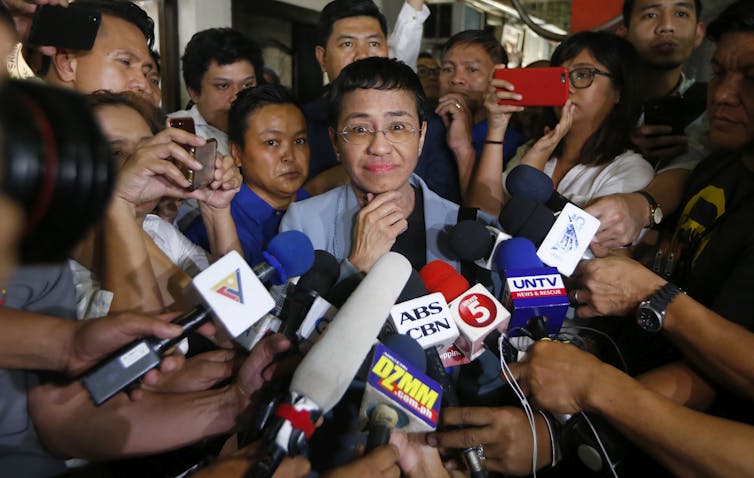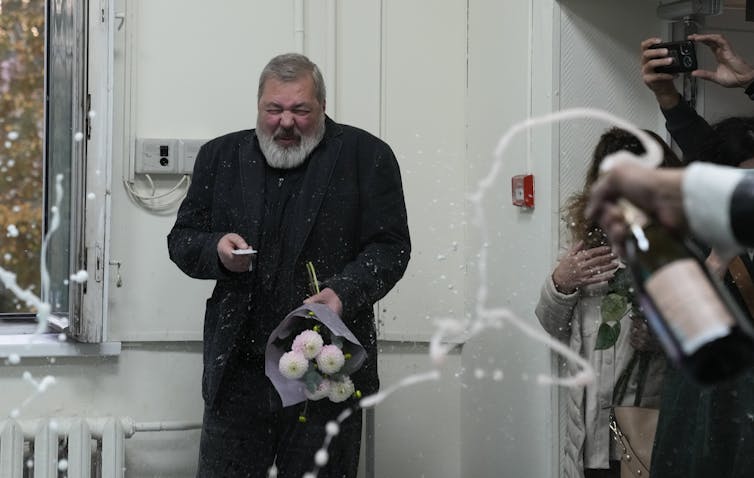
Experts in autocracies have pointed out that it is, unfortunately, easy to slip into normalizing the tyrant, hence it is important to hang on to outrage. These incidents which seem to call for the efforts of the Greek Furies (Erinyes) to come and deal with them will, I hope, help with that. As a reminder, though no one really knows how many there were supposed to be, the three names we have are Alecto, Megaera, and Tisiphone. These roughly translate as “unceasing,” “grudging,” and “vengeful destruction.”
A free press is essential to maintain a working semocracy. So said our founders, and I cannot disagree, nor can i trust the motives of anyone who does disagree. That would certainly not be the case with the Nobel Committee, who have awarded this year’s Peace Prize to two active (and embattled) investigative journalists. And it’s clear that the two people they hav chosen are genuine investigative journalists, committed to finding and publishing truth. The below article on them demonsrates that.
Unfortunately, we see around us far too many individuals who are not journalists, do not investigate, and have no prinviples. Alex Jones comes to mind, as does anyone on Fox News. Those people are committed, not to truth, but to deceiving those on the political right. But the left is not immune to being taken in as well. I am still seeing organizations on the left who are still taken in by Julian Assange, for example. Jefferson may have bben correct about his theory that a free press can, as a general rule, be trusted over a government, but he doesn’t appear to have realized that this is not always the case.
================================================================
Nobel Peace Prize for journalists serves as reminder that freedom of the press is under threat from strongmen and social media

AP Photo/Bullit Marquez
Kathy Kiely, University of Missouri-Columbia
Thirty-two years ago next month, I was in Germany reporting on the fall of the Berlin Wall, an event then heralded as a triumph of Western democratic liberalism and even “the end of history.”
But democracy isn’t doing so well across the globe now. Nothing underscores how far we have come from that moment of irrational exuberance than the powerful warning the Nobel Prize Committee felt compelled to issue on Oct. 8, 2021 in awarding its coveted Peace Prize to two reporters.
“They are representative for all journalists,” Berit Reiss-Andersen, the chair of the Norwegian Nobel Committee, said in announcing the award to Maria Ressa and Dmitry Muratov, “in a world in which democracy and freedom of the press face increasingly adverse conditions.”
The honor for Muratov, the co-founder of Russia’s Novaya Gazeta, and Ressa, the CEO of the Philippine news site Rappler, is enormously important. In part that’s because of the protection that global attention may afford two journalists under imminent and relentless threat from the strongmen who run their respective countries. “The world is watching,” Reiss-Andersen pointedly noted in an interview after making the announcement.
Equally important is the larger message the committee wanted to deliver. “Without media, you cannot have a strong democracy,” Reiss-Andersen said.
Global political threats
The two laureates’ cases highlight an emergency for civil society: Muratov, editor of what the Nobel Prize Committee described as “the most independent paper in Russia today,” has seen six of his colleagues slain for their work criticizing Russian leader Vladimir Putin.

AP Photo/Alexander Zemlianichenko
Ressa, a former CNN reporter, is under a de facto travel ban because the government of Rodrigo Duterte, in an obvious attempt to bankrupt Rappler, has filed so many legal cases against the website that Ressa must go from judge to judge to ask permission any time she wants to leave the country.
Inevitably, Ressa told me recently, one of them says “no.” Maybe that will change now that she has a date in Oslo. But Ressa probably knows better than to hold her breath.
Last year, when I – a long-time journalist turned professor of journalism – helped organize a group of fellow Princeton alumni to sign a letter of support for Ressa, more than 400 responded. They included members of Congress and state legislatures and former diplomats who served presidents of both parties. One of them was former Secretary of State George P. Shultz, who died several months later, making a show of solidarity with Maria Ressa one of his last public acts. This show of support is a sign of what’s at stake.
Three decades after the downfall of totalitarian regimes in Eastern Europe, forces of darkness and intolerance are on the march. Journalists are the canaries down the noxious mine shaft. Attacks on them are becoming more brazen: whether it is the grisly dismemberment of Saudi dissident and writer Jamal Khashoggi, the grounding of a commercial airplane to snatch a Belarusian journalist or the infamous graffiti “Murder the Media” scrawled onto a door of the U.S. Capitol during the Jan. 6 insurrection.
This irrational hatred of purveyors of facts knows no ideology. Former U.S. President Donald Trump’s disdain for the press is at least equaled by that of leftist Nicaraguan leader Daniel Ortega, whose response to his critics in the media has been to, well, lock ‘em up.
Digital menace
What makes today’s threats to free expression especially insidious is that they don’t come just from the usual suspects – thuggish government censors.
They are amplified and weaponized by social media networks that claim the privilege of free speech protection while they allow themselves to be hijacked by slanderers and propagandists.
No one has done more to expose the complicity of these platforms in the attack on democracy than Ressa, a tech enthusiast who built her publication’s website to interface with Facebook and now accuses the company of endangering her own freedom with its laissez-faire approach to the slander being propagated on its site.
“Freedom of expression is full of paradoxes,” the Nobel Committee’s Reiss-Andersen observed, in an interview after awarding the Peace Prize. She made it clear that the award to Ressa and Muratov was intended to tackle those paradoxes too.
Asked why the Peace Prize went to two individual journalists – rather than to one of the press freedom organizations, such as the Committee to Protect Journalists, that have represented Ressa, Muratov and so many of their endangered colleagues – Reiss-Anderson said the Nobel Committee deliberately chose working reporters.
Ressa and Muratov represent “a golden standard,” she said, of “journalism of high quality.” In other words, they are fact-finders and truth-seekers, not purveyors of clickbait.
That golden standard is increasingly endangered, in large part because of the digital revolution that shattered the business model for public service journalism.
“Free, independent and fact-based journalism serves to protect against abuse of power,” Reiss-Andersen said in the prize announcement. But it is increasingly being undermined and supplanted by what’s called “content,” served up algorithmically from sources that are not transparent in ways that are designed to addict and that drive partisanship, tribalism and division.
This poses a challenge for public policymakers and the democracies they represent. How to regulate digital media and still protect free speech? How to support the labor-intensive work of journalism and still protect its independence?
Answering those questions won’t be easy. But democracy may be at a tipping point. With its recognition of two investigative journalists and the crucial – and dangerous – work they do to support democracy, the Nobel Committee has invited us to begin the debate.
Correction: This story has been updated to state the correct place, Oslo, where the Nobel Peace Prize is awarded.
Editor’s note: Naomi Schalit, senior politics editor at The Conversation, signed the open letter “In defense of press freedom” organized by author Kathy Kiely in July 2020.
[Over 110,000 readers rely on The Conversation’s newsletter to understand the world. Sign up today.]![]()
Kathy Kiely, Professor and Lee Hills Chair of Free Press Studies, University of Missouri-Columbia
This article is republished from The Conversation under a Creative Commons license. Read the original article.
================================================================
Alecto, Megaera, and Tisiphone, these two recipients have shown themselves trustworthy and are genuinely deserving of the Prize they are being awarded, Not all journalists, and not all who call themselves journalists, would be deserving. Journalistic ethics are not an arcane subject – an actual professional code of journalistic ethics exists, and will fit on a bookmark if both sides are used. NOt that there’s any infallible means of actually enforcing them. Perhaps we should all print ourselves out a bookmark and keep it handy to help us evaluate what we are reading.
The Furies and I will be back.
8 Responses to “Everyday Erinyes #288”
Sorry, the comment form is closed at this time.

I’d argue there never really has been freedom of the press anywhere Joanne–there was even an effort to stop the Pentagon Papers.
The press in the U.S. has long been perverted to establish white supremacy as normal and right and why so many, even in OK never heard of the Tulsa Massacre.https://www.ncpolicywatch.com/2021/10/12/kathy-roberts-forde-talks-history-racism-and-journalism-at-unc-faces-its-own-values-crisis/?
As it becomes corporately owned, the voices permitted become more and more aligned with power and less inclined to investigate or report on government malfeasance. Thus I have long seen the need for somewhere else whistleblowers can turn and understood the significant need for something like Wikileaks in the digital age. I also abhor my country’s leaders seeking to assassinate Assange via the CIA.
An independent press that investigates the government may be more possible in countries where everyone agrees freedom is limited, oppression considerable, etc. than in countries claiming otherwise; thus the two who received the awards may have a greater body of work meeting that description than is true in those claiming to be democratic (yet jail whistleblowers and those who would reveal government misdeeds).
I personally would prefer to see Assange have very public and very truth-filled due process. And Seth Rich’s parents, who seem to be decent people, probably feel the same way. But it they did happen to want him dead, I could not find it in my heart to blame them.
Sadly, I’m not sure his health is still up to a full trial after all he’s been through. I do feel for Rich’s parents also, yet know their pain is also due to others’ choices.
Certainly others took part. But his use of innuendo virtually single handedly started the theory that rich was an Assancge source, which was never true (as can be proved by the timeline) and Assange knew it. Sure, Alex jones brought up Hillary’s name. But Assange gave that rumor legs and wings, when he knew very well those emails came from Russia. Check out my links. Listen to the recording (tone of voice reveals much.)
Fox “news” has defended itself and its henchmen – and prevailed – by admitting it’s NOT a “News” show, but entertainment.
And that “No reasonable person would believe the [bull$hit] we shovel”.
Yes, sigh. And no reasonable person is defending them now.
The Nobel Peace Prize Committee has done very well this year. Not only have they picked two representatives very worthy of the prize, but they’ve also saved their lives (for now) by putting them in the spotlight. It must have been a hard choice because there are so many who deserve that chance for the work they do by giving the muzzled and gagged a voice.
Amen!